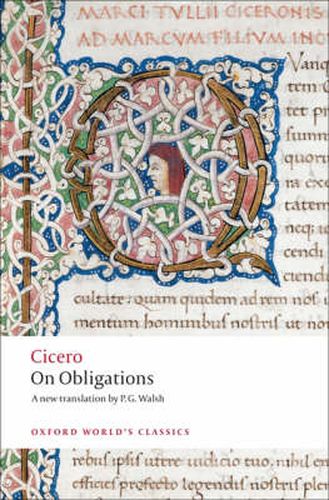Readings Newsletter
Become a Readings Member to make your shopping experience even easier.
Sign in or sign up for free!
You’re not far away from qualifying for FREE standard shipping within Australia
You’ve qualified for FREE standard shipping within Australia
The cart is loading…






On Obligations (De officiis) was written by Cicero in late 44 BC after the assassination of Julius Caesar to provide principles of behaviour for aspiring politicians. It explores the apparent tensions between honourable conduct and expediency in public life, and the right and wrong ways of attaining political leadership. The principles of honourable behaviour are based on the Stoic virtues of wisdom, justice, magnanimity, and propriety; in Cicero’s view the intrinsically useful is always identical with the honourable. Cicero’s famous treatise has played a seminal role in the formation of ethical values in western Christendom. Adopted by the fourth-century Christian humanists, it beame transmuted into the moral code of the high Middle Ages. Thereafter, in the Renaissance from the time of Petrarch, and in the Age of Enlightenment that followed, it was given central prominence in discussion of the government of states. Today, when corruption and conflict in political life are the focus of so much public attention, On Obligations is still the foremost guide to good conduct.
$9.00 standard shipping within Australia
FREE standard shipping within Australia for orders over $100.00
Express & International shipping calculated at checkout
Stock availability can be subject to change without notice. We recommend calling the shop or contacting our online team to check availability of low stock items. Please see our Shopping Online page for more details.
On Obligations (De officiis) was written by Cicero in late 44 BC after the assassination of Julius Caesar to provide principles of behaviour for aspiring politicians. It explores the apparent tensions between honourable conduct and expediency in public life, and the right and wrong ways of attaining political leadership. The principles of honourable behaviour are based on the Stoic virtues of wisdom, justice, magnanimity, and propriety; in Cicero’s view the intrinsically useful is always identical with the honourable. Cicero’s famous treatise has played a seminal role in the formation of ethical values in western Christendom. Adopted by the fourth-century Christian humanists, it beame transmuted into the moral code of the high Middle Ages. Thereafter, in the Renaissance from the time of Petrarch, and in the Age of Enlightenment that followed, it was given central prominence in discussion of the government of states. Today, when corruption and conflict in political life are the focus of so much public attention, On Obligations is still the foremost guide to good conduct.